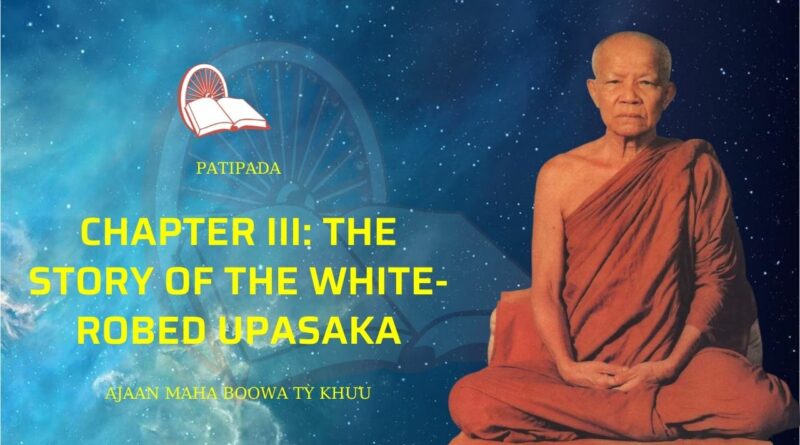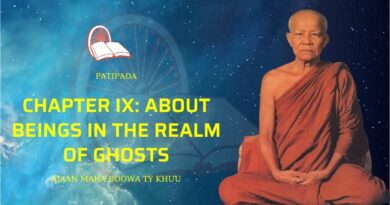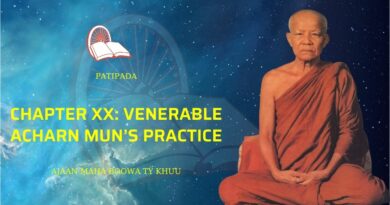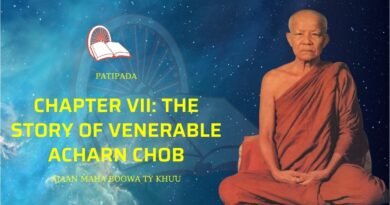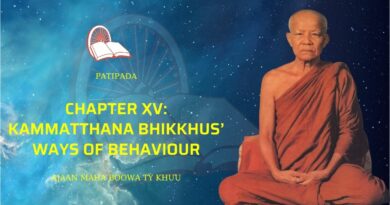PATIPADA – CHAPTER III: THE STORY OF THE WHITE-ROBED UPASAKA
The foregoing methods have been used by those Bhikkhus who go to live in the forest, to train themselves, and they have gained satisfying results from them, and the tigers have never harmed any of them.
Here, it is appropriate to relate a story so that the reader may think about what happened in this incident. There was an Acariya who was a senior follower of Venerable Acharn Mun, and at this time he was practising the way of Dhutanga while wandering along the bank of the Mekong River on the Laotian side and with him was an Upasaka — a white robed lay follower. This Acariya was temporarily staying under an overhanging cliff and the Upasaka who maintained the eight moral precepts was staying under another such cliff about 120 meters away. This Acariya who told the story, said that he had stayed there for several months for he reckoned that it was good for the health of both his body and heart, and the practice of the “Dhamma of a recluse” (Samana–Dhamma) developed smoothly without any obstacles, both for him and for the Upasaka. The obtaining of food on the alms round (pindapata) was not difficult for they were no more than four kilometres from the nearest village where there were about fifteen houses and the villagers did not come out and bother them, making difficulties and wasting a lot of time when they could be developing the practice of Dhamma, for each of them went about their own business accordingly.
One day in the afternoon the Acariya felt a bit unwell as if he had a slight fever, now hot now cold and the body feeling not quite normal. When the Upasaka came to where he was staying he told him to go and boil some water to mix with some medicine that he thought he would try, thinking that it may effect a cure. A doctor had told him that this medicine could cure malaria and he was afraid that this was the beginning of a bout of malaria. For there was a lot of it about in that district and many people suffered from it as the forest was very thick and people accustomed to living in open country and farmland were not able to go and stay there. It was also teeming with all sorts of wild animals, tigers and other members of the cat family, and at night their cries and roars were very noisy. It seems that there were also some man-eating tigers in the district which was said to be due to the Vietnamese who make them ferocious and not afraid of people.
As soon as the Upasaka understood what was required he took the kettle to the place where he was staying, to boil the water. After that the Acariya did not see him again and he did not bring the hot water back to him. The Acariya waited until it got dark, but still he did not come, so he thought that the Upasaka may have forgotten about it because he was sitting in meditation and becoming absorbed in the practice and neglecting his duties. Meanwhile the symptoms of the Acariya’s fever became steadily milder until it went away altogether.
As for the Upasaka, after getting the kettle he prepared things to make a fire, but however he tried to light it, the fire would not catch, until he started to get angry. Then, forgetting that he was an Upasaka and a follower of an important Kammatthana Bhikkhu, he stood up suddenly and thought with anger: “I have made a fire here many times, but why won’t it catch this time? Maybe it needs some water. If it needs water I will give it some.” Thereupon he urinated all over the place where he set the fire until it was all wet and then walked away without saying anything to the Acariya who waited for some hot water until it was night time. Once the night had fully set in some very strange and unusual things occurred.
Previously, while he had been staying there, nothing much unusual had occurred. But this night about 9 p.m., the white robed Upasaka was sitting in meditation and contemplating the misdeeds that he had done and his careless attitude towards the Acariya which was due to his anger which made him stand and urinate over the firewood. In addition he never went to ask the Acariya for forgiveness so as to rectify his fault and negate his bad kamma. While he was sitting and reflecting on his faults in a restless anxious manner, there was suddenly a great loud noise from about two yards behind him, the roar of a huge tiger which was crouching and looking at him as if it was just about to leap on him and eat him up. It was also continuously growling softly — enough to test how much courage there was in the anger of a kammatthana disciple — and loud enough so the Acariya could also hear it where he was staying.
While it was growling it also smacked its tail up and down, hitting the ground with a thudding noise and shifting about back and forward as if it was getting ready to spring on the Upasaka and make fresh food of him right there and then. As soon as the Upasaka heard this unusual sound which he had never heard so close to him before he became frightened for the first time since he came there several months previously and he quickly turned round to see what it was. It was about the time of the full moon and he could see this huge tiger crouching there, looking at him, quite distinctly. His blood turned to water, he shook with fear and almost went unconscious. He could think of nothing and his heart turned for refuge to the Buddha, Dhamma and Sangha as a matter of life and death. “May the Buddha, Dhamma and Sangha protect me and guard me,” he pleaded, “and don’t let this tiger eat me up tonight for then I would not be able to ask forgiveness for my misdeeds, from Venerable Acariya — which I did wrong to him this afternoon. May the Buddha help and protect me for the whole of this night and may the Dhamma and Venerable Acariya have “metta” and make my “kamma” void for those things which I did wrong. Don’t let it come to the point where I must be eaten by this tiger in punishment for these offences.”
Thus he pleaded, he begged, he repeated “Buddho”, he quivered, shivered, and he turned around and stared at the tiger, afraid it would leap on him and eat him up immediately. But the tiger, as soon as it saw a man turn round and stare at it, drew back a little while still growling the whole time. Then in a short time it shifted its position and came in from a new direction and then drew back again, going back and forward all the time in this way.
Meanwhile the Upasaka felt like death, being forced to turn this way and that, nervously following the restless movements of the tiger going back and forth all round his mosquito net without let up. When he took an attitude of staring intently at the tiger it withdrew, and at times it went so far away that it seemed it may be going for good. But as soon as he relaxed a bit and let his attention wander it would come back right up close to him. He could not let “Buddho” and his heart separate and he had to go on repeating it until the heart became attached to it and he held on to it all the time as his guarantee of life. But as soon as “Buddho” started to slip away a bit the tiger started to move in closer every time. When he saw that his position had got worse he quickly recollected — “Buddho” and implored the Buddha to save his life. Then once “Buddho” had become close to the heart, the tiger drew back as though it was going away for good.
But the characteristics of people are such that they generally need to be forced to do things, so as soon as the tiger drew away some distance, “Buddho” started to drop away from the heart — thinking that he would not die. Then the tiger began to move in again and prepare itself, as if it were getting ready to jump on him, but it never did anything but to keep on changing the direction from which it approached.
There was no let up in the battle between the tiger and the Upasaka which went on from 9 p.m. until dawn with neither of them being ready to admit defeat and the tears of the Upasaka flowed the whole time because of his fear of death or at least until there were no more tears left to flow. But as soon as the light of dawn came, the tiger slowly drew back to about eight yards and then slowly walked away until it went out of sight.
Although the tiger had gone, the Upasaka stayed for a long time under his mosquito net watchful and alert, not daring to go out for fear that it was hiding close by. He was afraid that as soon as he relaxed and came out from his mosquito net it would jump on him and eat him up. So he felt compelled to sit and wait and watch the situation from under his mosquito net for a long time until he saw that all was quiet, that it had gone and was not returning. Then he quickly left his net and ran to where the Acariya was staying, confused, quivering, wild eyed and babbling incoherently so that what he said made no sense.
Seeing the Upasaka’s unusual behaviour, the Acariya questioned him and managed to find out that he was asking to be pardoned for the offences which he did against the Acariya the previous afternoon. He explained the reasons for his wrong actions and told him everything including the coming of the tiger and the way it stayed around all night.
But the Acariya, instead of pardoning him at once, turned and spoke in a menacing manner, thereby increasing his concern, saying: “What you like you get. If you like what is good you get what is good. If you like what is bad you get what is bad. But in this case you like tigers so you got a tiger. So what’s the use of asking me for a pardon, I cannot pardon you yet. At least you should meet those good things that you like for one more night. If then, you don’t die from being eaten by the tiger you will at least have learnt a long lasting lesson which you can reflect upon. The tiger is better than the Acariya, so I shall let the tiger teach and train you. What do you think about that, shall I hand you over to the tiger tonight? If you don’t listen to its teaching I shall let it take you away for food once and for all, for I’m tired of teaching you. What do you say, is that what you want? Meeting the tiger and listening to its teaching all last night was quite appropriate to the circumstances, and tonight I will have it come and teach you again. If after that you are still obstinate I will let it take you and turn you into sustenance for its wanderings. Its belly would be well filled for several days. Well, what’s it going to be? Say quickly and don’t dawdle! Who is the better, the Acariya or the tiger? Answer now, don’t hesitate or in a moment I shall call the tiger to take you away and make use of you, which it will do in a far more effective way than this Acariya.”
After saying this he acted as if he were calling the tiger, saying: “Where has that tiger gone to now? Come back quickly and take him away now, don’t wait about. I’ll turn him over to you to be your follower, so come quickly and take him away.”
At this point the Upasaka cried out loudly and wept, completely losing his composure and implored the Acariya, saying: “I am very afraid and I implore Venerable Acariya not to call the tiger here or I will die right now. Last night I thought I was about to die at one time, but I recovered and came around enough to retain consciousness, so I have come quickly to Venerable Acariya for help. But you keep calling it back again, and where would I get enough spirit to stand up to it. So Venerable Sir, I implore you to tell it to go away and not come back again.”
After weeping and imploring Venerable Acariya not to call the tiger again; after prostrating and pleading for his life, conceding his fault in what he did and saying that he would be more self-controlled and careful in the future; after promising that he would never do such an act again while the dread of the lesson he had learnt was still before him; and after coming to implore the Acariya to forgive him; the Acariya seeing that the situation was right granted him forgiveness and taught him and spoke to him mildly and soothingly, saying: “It was nothing but your own evil kamma which brought that tiger to you. If you still don’t accept the blame for your evil deed, you will see it more clearly tonight! For as soon as night falls that tiger will come and take you away and it won’t come back again. It won’t speak nicely and act playfully as it did last night.
When you have been hurt you remember it, for good and evil are always there in the world and nobody can get rid of these two aspects of nature. If it were possible for kamma to have been put under the power of any being or principle anywhere, such an authority would be sure to have eliminated both of those aspects of nature long ago so that there would be none left to come down to us now. But the fact is that good and evil kamma are still here and this is because kamma does not depend on any special being or power, but only upon each individual who makes his own kamma.
In this instance you made evil kamma yesterday afternoon and you must see your own evil kamma. But if you are still not ready to see your fault, it is quite certain that tonight the striped and tawny lord of kamma will come to take you away for you to see the results of kamma quite clearly for yourself.”
Having admonished him the Acariya told the Upasaka to return to the place where he was staying, but he did not want to go, for fear that the tiger was hiding in wait for him and would jump on him and maul him and take him away and eat him. So the Acariya had to coerce him by making him frightened once again. “Just now you said that you accepted and saw the evil of your obstinacy and that you would not do this again. But you have hardly finished saying this and you are being obstinate once again. Why is this? If that’s the case you can go on being obstinate if you can really stand up to that tiger.” Then the Acariya called out to the tiger once again to come, saying: “Tiger! You who are the Acariya of this Upasaka, where are you? Come here quickly to take away this obstinate Upasaka and teach him a bit will you. I’m tired of teaching him. Hurry! Come quickly!”
As soon as he had finished speaking, the Upasaka began to weep again and promised saying: “I will go back right away now but please don’t let the tiger come at all, I am very afraid of it and last night I almost died.” Then he hurried back to where he stayed without thinking any more about being afraid or about death. It is very strange and wonderful how from that day on there was no sign of that tiger prowling about in the district, right up to the time when they moved away from there, which was several months later. In the normal way of thinking it would seem that there must have been something which influenced that tiger to come out and torment the Upasaka who was bold, stupid and evil enough to act in wrong and improper ways, such as standing and urinating all over firewood. Even an ordinary person who is not interested in practising the ways of moral behaviour and Dhamma would not normally do such a thing.
For such a person there is not much that can keep him under control — except for a large tiger which is his equal and can torment and train him. From then on, the Upasaka was completely subdued and the Acariya said that afterwards he never displayed any obstinacy. It was very effective, for tigers are very able to torment and teach people and to instil a fear into them which lasts a long time.
Here, I should like to digress a bit, to insert a personal comment. For, I would like to get a tiger to come and live in the vicinity of Wat Pa Baan Taad to help me by taking over some of my responsibility when the Bhikkhus, Samaneras, Theras, Nuns or any others become lazy in their practice and spend their time sleeping. It would help to rouse some effort in them, for even if they didn’t actually see it, but it only helped by the sound of its roar, it would probably be enough to open their eyes and ears and make them get up and do some practice so that they did not indulge in sleeping too much.
On the other hand, if a tiger came to stay here many of the village dogs who live around the Wat would be so scared they would all run away, which would be a loss of help as they also have been “Acariyas”, teaching people who are too lazy to close doors and to look after and put away items of food and edible things. The ideal situation would be to retain both of these “Acariyas”, the tiger and the dogs, to help both in stirring up effort and in putting away and looking after various things. This monastery would then be complete, having both people diligently doing meditation practice and diligently looking after things.
If this were the case it would be very good. But I am afraid that the Bhikkhus, Samaneras, Theras, Nuns and all other followers who come from various places, who are scared of tigers and lazy and careless about looking after things would cause trouble and get angry with the Acariya, complaining: “Why get a tiger to torment us? This is quite unnecessary and is just a big nuisance.” But truly speaking there ought to be something standing by to help act as a reminder to people because the Acariya alone cannot keep up with all of them.
Generally it is in the “kitchen” area, where the women visitors and upasikas who come from many places to stay, that they lose out to the dogs from the village which come quietly and hide in the Wat in large numbers all the time, to steal edible things which they then take away and eat.
Although this is not very important, nor something to get upset about, it is nevertheless a shortcoming which is undesirable. For wherever we say that there is a shortcoming in anything it means that the whole is deficient. Especially when this applies to people, and when they are not even interested in correcting themselves it is much worse.
I hope the reader will forgive this diversion but as it has a relationship with the foregoing account it was put in here. But now we will return to the story of the Acariya and Upasaka, which is still not finished.
Afterwards, the Upasaka was very watchful for fear of the tiger all the time, day and night, for he saw in his mind an image of that large tiger quite vividly and he thought about it coming and searching for him every time he breathed in and out until evening came. He could not relax and take it easy, being obsessed with the idea that the tiger would jump on him, tear him apart and eat him up. But this had a good side to it, for whenever he recalled and saw an image of the tiger, he immediately recalled “Buddho” and there was no time for his mind to slip away. That night, as soon as it began to get dark he started doing his meditation practice, sitting and recollecting “Buddho” part of the time, and part of the time thinking that the tiger would come, thus alternating between the two. He could not sleep and do meditation practice as he had been used to doing it, for while doing the practice his eyes were expecting to see the tiger, so for the whole of that night right through to the light of dawn he had no sleep. Because if he had relaxed and slept, what then would he do if the tiger came? It would be just like waiting for it to come and take him and eat him at its leisure!
As soon as it was dawn he went in a hurry to his Acariya, who asked him: “How was it; did your teacher, the tiger, come and visit you again last night?” He replied that it had not come, and then the Acariya spoke quietly and soothingly to him, saying: “What is the use of being afraid of it, if you were afraid of your own evil in the way that you are afraid of this tiger you would have gained freedom from Dukkha long ago. You must hurry to get rid of the evil which has accumulated in your heart by reducing it steadily and finally eliminating it. Why be so concerned about the tiger, it will not come and do anything. You can take my word for it that as long as you don’t do anything evil again the tiger will not come. You must do your meditation practice to make you feel at ease. Then the tiger will be happy and not anxious about you so there won’t be any need for it to come and see you often and lose time in searching for its food. In fact it only came to help you and to drag you up out of hell because of the evil you had done, otherwise you truly would have fallen into hell. So if you don’t do any more evil things, the tiger will not come with any intention of eating you. Take good care of yourself, and if you try hard and work diligently at your meditation practice you won’t see that tiger again, as you saw it when it came to visit you, until we leave this place.”
From that day on, the tiger was never again seen wandering around that district, just as the Acariya had predicted. After that, even though there were still sounds of tigers roaring from time to time, this was normal, the same as would be heard everywhere in the forest and not something that was disturbing. The Upasaka worked hard at his meditation practice and got rid of all his opinionated conceit so that he was transformed into a good person both inwardly and outwardly. From the time that the tiger came to help and train him, even though it was only one night, there was nothing that one could blame in the Upasaka. This was so strange and unusual a thing to happen that it still has not been forgotten. As for the Acariya, he never had any fear at all, and even when the Upasaka came to tell him all about it he was quite unperturbed. He said that the tiger which came was in fact a creation of the Devas.
This Acariya was a senior follower of Venerable Acharn Mun and he liked to live on his own, deep in the forests and hills, depending for his food on going pindapata to the local farmers. During the time that he spent living under a cliff with the Upasaka he was able to progress in the development of his citta far more than in other places, so he stayed there for many months — until it was near the beginning of the rainy season when he returned to the Thai side of the river.
He said that while the tiger was growling softly at the Upasaka, he heard it quite clearly but he took no notice of it because they could be heard all the time so that it was normal and he was used to it. But when the Upasaka came and told him about it, weeping and wailing because he was afraid, the Acariya thought about it and examined what had occurred. A Devata also came and told him about it, so he knew that the Devata had made that tiger to discipline the Upasaka and cure his overweening conceit. Otherwise he would have become used to it and would have displayed his obstinacy all the time, doing evil things more and more so that when he died he would fall to hell. Therefore it was necessary to cure this state in such a way that he would never dare to act in this manner again.
The Acariya said: “What the Devata said was true because from that day on the Upasaka’s character and behaviour changed entirely and he became a different person. Previously he had been quite obstinate and at times he had the characteristics of someone who was a bit mad, but I never objected and I let him go on in his own way. It was not until the tiger came and straightened him out and broke his obstinacy by its rough and forceful ways that I saw clearly how this Upasaka had some very bad characteristics indeed and he was not at all mad. If he had been a bit mad, even the tiger coming to teach him would have been of little value and the madness would probably have come back again. But with this Upasaka, since that day none of his evil characteristics has returned and he is always good and right minded.”
This Acariya has a very high standing in Dhamma and he is worthy of worship and devotion, but he died five or six years ago. When he was close to the time of leaving the five khandhas he said that he did not want anyone to be disturbed and bothered about him for it would cause needless distraction and worry to them. He wanted to die quietly in the way of the Kammatthana tradition, which means that his death is fully in accordance with that of a Bhikkhu who practises the way and is not broadcast with a lot of fuss. When they cremated him, none of the senior Bhikkhus in the country knew about it for it would just be a nuisance and cause a lot of disturbance. “Concern about dead people, who are worthless, their assets having all dried up, is not likely to be of much use when compared with concern for the living.” He spoke simply in this way and nobody dared to go against his words. For those were his parting instructions to them which came from a “true heart”, and they were afraid that it would be bad and evil to go against what he had said.
While he was still alive I once went to stay with him far away in the hills, for about a fortnight. The place where he was staying was hill forest and he depended on the local farmers for getting food on pindapata, which was enough to live on day by day, and he was said to have stayed in that place for many years (vassa). While staying there I timed how long it took to go on pindapata, going out and back. From the place where he was staying to the edge of the forest took just three hours twenty minutes and to the village a total of four hours.
His name was Venerable Acharn La and his original home was in Vientiane (Vieng Chan), Laos. From the time of his ordination until he died he lived most of the time on the Thai side of the Mekong River, because most of his Dhamma friends and the Acariyas who practised the way were in Thailand.
In his practice of the “Samana Dhamma” he was very courageous and resolute and liked to live and go about on his own, or at most he would have only one Upasaka with him. He had the faculty of knowing many strange things including those beings who had Deva bodies such as the Devatas who worshipped him. He said that wherever he stayed such beings nearly always went there and protected him all the time. His nature was to want little, to be fully content all the time and to dislike going into society, even amongst his friends and other Bhikkhus. He always liked to live in the forests and hills with the local farmers, and the forest and hill people. His level of Dhamma was very high and worthy of praise and worship. In the direction of samadhi and pañña he was very skilful and proficient, but most people, including Bhikkhus and Samaneras, did not realise this because he never made any show or display of it. It was only those who had lived close to him who knew well about it.
It was about 2493 BE (1950 CE) that I went to stay with this Acariya and I had the opportunity of learning from him and asking questions. I found that his Dhamma was very deep, penetrating and absorbing. He could explain the “production of causes” (Paccayakara), which is avijja, well and in a very profound way. It would be difficult to find anyone who could explain it so well, because the Paccayakara is a very subtle and profound Dhamma and it can only be explained properly and in depth by someone who is well experienced and adept in the practice of citta bhavana. For the Paccayakara, or avijja, are very subtle kilesas and he must be endowed with an equally subtle degree of insight-wisdom (pañña–vipassana) to be able to find out about and to eradicate the basis of Paccayakara which is the true nature of avijja; and also to be able to explain it correctly. This Acariya was one of those who were able to explain the Avijja–paccayakara with great subtlety, but it is beyond the ability of the writer to explain it here, so we must regretfully pass on to other things.
While this Acariya was staying with Venerable Acharn Mun and Venerable Acharn Sao, he learnt the practices of eating only once a day and wandering in the traditional way of kammatthana in the forests and hills. He went on doing this from the day of his ordination until he died, and he never slackened in the practice of his religious observances and duties, nor in his work by way of the heart.
This was an Acariya who was so unfailingly resolute in his practice of Dhamma that it is hard to find anyone like him in this present age and he should be taken as an example by all those who are interested in doing the practice of Dhamma. This ends the story about this Acariya.
Before writing about the above Acariya we were discussing the methods of training and discipline of the hearts of Dhutanga Bhikkhus with frightening things, such as tigers. As this was not completed we shall return to this subject.

